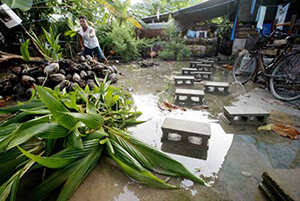
WELLINGTON (RNZI / New Zealand Herald / Newstalk ZB / Pacific Media Watch): The Alesana family of Tuvalu is thought to have become the first legal group of "climate change refugees" after winning a court appeal to stay in New Zealand.
Sigeo Alesana and his family applied for refugee status on the grounds that climate change would negatively impact on them if they were forced to return to Tuvalu.
But their application was turned down. However, this week they won an appeal against that decision and were granted leave to remain in New Zealand.
It is not clear whether other Pacific Islands residents threatened by climate change will be able to use the ruling as a precedent because, according to RNZI, the immigration tribunal "turned down their asylum application but accepted them on humanitarian grounds because of their strong family and community links to New Zealand".
This point has excited much debate with immigration lawyers offering up different opinions to environmental lawyers about whether the Alesana family could pave the way for others to leave their low-lying Pacific islands in the same manner.
Immigration lawyer David Ryken told Newstalk ZB that people only qualified for refugee status if they had been persecuted by humans.
"He says you can't establish a well-founded fear of persecution arising from natural causes or the environment," Newstalk ZB reported.
No 'open ticket'
But environmental law expert Vernon Rive told the New Zealand Herald that the decision was "quite significant" even though it was not an "open ticket for people from all the places that are impacted by climate change".
"It's still a very stringent test and it requires exceptional circumstances of a humanitarian nature," Rive told the newspaper.
The Alesanas' lawyer, Trevor Zohs, maintained that the risks of climate change had played a role in the immigration tribunal's decision as it had taken into consideration the link between "poor water quality" caused by climate change and illnesses that the family's children had suffered as a result.
One other Kiribati family has applied for refugee status on the same grounds but has had their application rejected and their appeal dismissed, and is currently fighting deportation.
The application made by Ioane Teitiota who came to New Zealand in 2007 and has three children born here, was rejected after Justice John Priestley found that granting his family climate change refugee status would allow "millions of people who are facing medium-term economic deprivation, or the immediate consequences of natural disasters or warfare" to claim refugee status.
This work is licensed under a Creative Commons Attribution-NonCommercial 3.0 New Zealand Licence.




